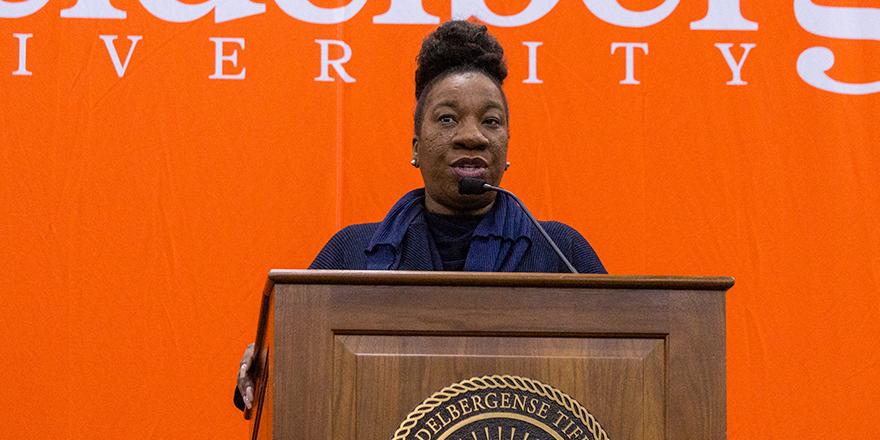
Helping survivors of sexual violence truly heal takes more than awareness of the pervasiveness of the problem, according to Tarana Burke, civil rights activist and originator of the #MeToo movement. During her visit to Heidelberg Tuesday as the keynote speaker for HYPE Career Ready® program, Burke shared the story behind the genesis of “me too” and its viral hashtag.
“me too” is more than a hashtag that exploded overnight. It is a grassroots movement built on providing a pathway to healing for survivors that also seeks to create advocates and solutions to interrupt the sexual violence cycle among individuals and in communities.
“This is not an awareness campaign. We are aware,” said Burke, who has committed more than 25 years of her life to social justice. “We want solutions. People on the sidelines will stay there if we don’t find solutions.”
Tarana Burke’s formative years
Burke, who grew up “in an ordinary place” in the Bronx, became an organizer at age 14 through her association with the 21st Century Youth Leadership Movement. “At 14, 15, 16, I realized that my voice had power and I could use my voice to galvanize people,” Burke said. She enrolled in Auburn University, and that’s where some valuable new insights began to form – insights about race relations, gender relations and the power of organizing. And while everyone seemingly knew about sexual violence, no one was talking about it – including Burke, who is herself a survivor.
While at Auburn, the case of a co-ed who accused a football player of sexual assault came to light. “What I remember most is how people talked about the girl … how she was going to ruin the football season, how she was drunk at a party. Every conversation focused on how the girl was complicit in her own behavior,” Burke recalled. In her circles, people had empathy for the girl but decided it was none of their business.
“I wish I had more backbone in that moment to say, ‘It is our business. She’s a human being.’ We all let it fail.”
‘This happened to me too’
Another wake-up call occurred after Burke graduated from college. She had begun to work professionally for 21st Century as a camp organizer. One of the teen camp attendees with whom Burke had become close confided her own sexual assault. In that moment, Burke said, “I held my breath the entire time. I didn’t have space for it. In my brain, I’m thinking, ‘I don’t know what to say’ and in my heart, I’m saying, ‘This happened to me too.’”
“I told her to stop and sent her to another counselor, and I just saw her shut down. The fact that I couldn’t say ‘me too’ was where all of this started.”
She decided in that moment that never again would she remain silent, especially in the presence of a survivor. “In that moment, I wish somebody had told me I wasn’t alone. I wish that somebody had told me that healing was possible,” she said.
“me too” goes viral
Burke began laying the ground work for “me too” in 2006 as a way to help young women of color who had survived sexual violence. She had no idea her grassroots movement would be thrust into the national – even international – dialogue and become a rallying cry for survivors of sexual violence when it went viral in October 2017 all over social media. In just a few hours, millions of people shared their own stories of sexual assault; 12 million had used the hashtag on Twitter, Facebook and Instagram.
“It became clear that this cause was bigger than any group of people,” Burke explained. “People finally began to understand that sexual violence doesn’t discriminate and understand that it’s deeply pervasive,” Burke said.
A year later, Burke said she’s grateful about the expanse of the dialog, but it’s not enough. “We need to see policies change, see some culture changes. If we don’t get ahold of the narrative right now, we will lose the momentum we have.”
A Heidelberg experiment
To visually demonstrate the magnitude of sexual violence, Burke asked every fourth person in the Heidelberg audience to stand and then move to one side of the gym. Those people represent 25 percent affected by sexual violence. “This is what it looks like when people say ‘me too.’ We’re talking about real people with real faces, real men and women, real survivors.”
She reiterated her point that “me too” is not an awareness campaign but a call to action to recognize the urgency of the moment and the opportunity to stop sexual violence.
She left the Heidelberg audience with these words: “You need to figure out your work to make sure it doesn’t continue to happen.”
Her work continues
Today, Burke continues to work under the “me too” banner. She serves as is the senior director of programs at the Brooklyn, New York-based Girls for Gender Equity. She’s heard on various platforms to continue to discuss the “me too” movement. In 2017, she and other influential female activists were recognized as Time magazines People of the Year.
Learn more about HYPE Career Ready®.